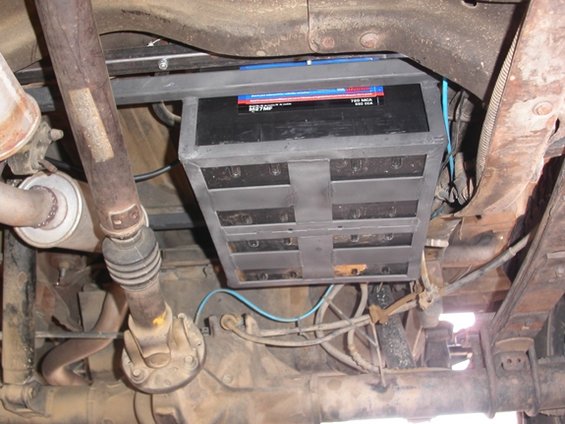You are using an out of date browser. It may not display this or other websites correctly.
You should upgrade or use an alternative browser.
You should upgrade or use an alternative browser.
Water and batteries mounted under a truck
- Thread starter Smoky
- Start date
Ducky's Dad
Explorer
I have AGMs mounted to the frame, under the cab. They have been submerged for brief periods with no issues.
Ducky's Dad
Explorer
Jr_Explorer
Explorer
The question remains... HAve any of you forded a river/stream deep enough to completely submerge the battery terminals with no ill effect? I have been thinking of mounting batteries where my spare is (once the spare is on a swing away) but I too worry about the effects of submerging them completely.
^^^^^ Water is an extremely poor conductor, submerging the batteries during a water fording will not do anything to the batteries. Pure H2O is actually an insulator, it is the impurities in water that can make it conductive. I know this is contrary to pop culture and horror movies but since when does science and those two contradict?
Toymaster, free-flowing water is full of impurities...I don't know of any distilled water streams or lakes. Incidents where people are electrocuted through contact between water and electricity are anything but rare.
Yes, and with being "full of impurities" water is still an extremely poor conductor. Also, 12 Vdc is a whole lot less pressure than 120 or 240. All the events you mention are dealing with the higher potential; it is like comparing apples to oranges....
If you don't believe an electrical engineer then maybe you will believe the gov'ment.... http://water.usgs.gov/edu/electrical-conductivity.html
Last edited:
I was merely suggesting that, in the real world, water as we encounter it is a very good conductor of electricity. What the article says is that water loses its insulating properties once any number of substances are dissolved in it, at which time it becomes a very good conductor of electricity.
"Water quits being an excellent insulator once it starts dissolving substances around it."
"Interestingly, if the water contains very large amounts of solutes and ions, then the water becomes such an efficient conductor of electricity that an electrical current may essentially ignore a human body in the water and stick to the better pathway to conduct itself—the masses of ions in the water. That is why the danger of electrocution in sea water is less than it would be in bath water."
I get the difference between 12v and 120/240 so I accept your response around intensity but, since I'm not an electrical engineer, I really have no idea how a 12v battery would react to being submerged in water, or why, which is why i started this thread in the first place. A few folks have shared their experience, and I value that, but I'd really appreciate knowing the physics behind why submerging a 12v battery won't short it out.
"Water quits being an excellent insulator once it starts dissolving substances around it."
"Interestingly, if the water contains very large amounts of solutes and ions, then the water becomes such an efficient conductor of electricity that an electrical current may essentially ignore a human body in the water and stick to the better pathway to conduct itself—the masses of ions in the water. That is why the danger of electrocution in sea water is less than it would be in bath water."
I get the difference between 12v and 120/240 so I accept your response around intensity but, since I'm not an electrical engineer, I really have no idea how a 12v battery would react to being submerged in water, or why, which is why i started this thread in the first place. A few folks have shared their experience, and I value that, but I'd really appreciate knowing the physics behind why submerging a 12v battery won't short it out.
Last edited:
^^^ Because there is not enough electrical pressure (12V) to force electrons through the media (river water) at any rate fast enough to cause harm in a real world situation. The resistance in the media is still not low enough to conduct a sufficient amount of power (1000's of amps) to cause harm to the battery (explosion). Now if you have very salty water and the battery sits in it for a loooong time you may have enough flow to drain the battery voltage level low enough to cause harm.
Crossing a river or driving in the rain, is not going to cause the battery to explode or any other harm.
Crossing a river or driving in the rain, is not going to cause the battery to explode or any other harm.
Ducky's Dad
Explorer
T
Yes, with AGMs. No problems.he question remains... HAve any of you forded a river/stream deep enough to completely submerge the battery terminals with no ill effect?
Similar threads
- Replies
- 30
- Views
- 2K
- Replies
- 18
- Views
- 3K
- Replies
- 4
- Views
- 2K
- Replies
- 0
- Views
- 745


